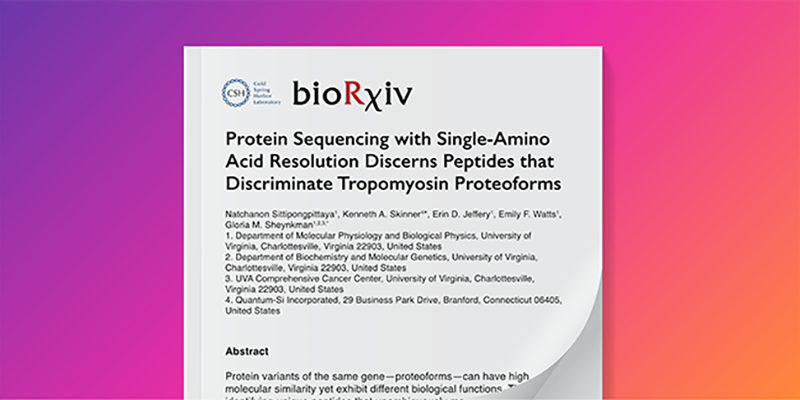The Potential of Next-Gen Protein Sequencing™ to Enhance Protein Characterization Techniques for Exploring Proteomic Diversity
December 1, 2024 • Meredith Carpenter, PhD

December 2, 2024 • Meredith Carpenter, PhD – Head of Scientific Affairs
Imagine a world where we can unravel the intricate details of protein diversity with single-molecule precision. This vision is becoming a reality thanks to a recently released preprint publication on bioRxiv from Dr. Gloria Sheynkman and her team at the University of Virginia School of Medicine. This study, entitled “Protein sequencing with single amino acid resolution discerns peptides that discriminate tropomyosin proteoforms,” marks a significant milestone in proteomics by demonstrating that Platinum®, the Next-Generation Protein Sequencer™ (NGPS) can distinguish closely related proteoforms—variations of proteins that traditional tools like mass spectrometry and antibodies can struggle to differentiate. This technology unlocks new possibilities for understanding protein function, regulation, and disease mechanisms with exceptional precision.
Proteoform analysis has long been challenging due to high sequence similarity among variants, dynamic tissue-specific expression patterns, and the complexity of data analysis. The ability to achieve single-amino-acid resolution is thus highly valuable, especially for variants with nearly identical masses that are indistinguishable by mass spectrometry. Platinum overcomes this limitation by directly sequencing single molecules, enabling researchers to identify subtle differences in peptides, even when separated by only one amino acid or modification. This level of granularity is particularly transformative for studying diseases in which proteoform variation plays a key role, such as cancer and neurological disease.
The implications of this technology extend beyond basic research. By providing precise identification of disease-specific proteoforms, Platinum holds promise for advancing precision medicine. This approach enables a more comprehensive understanding of proteoform diversity at the single-molecule level, which can inform the development of targeted therapies and diagnostics. As proteoform-specific insights become more accessible, researchers will be better equipped to decode the intricate protein networks underlying health and disease.
Dr. Sheynkman’s work demonstrates the transformative potential of NGPS™. Platinum sequencing offers a truly orthogonal method to current mass-spectrometry and antibody-based approaches, allowing researchers to expand their toolkit for exploring proteoform biology. While genomics and transcriptomics have paved the way for our understanding of genomic structure and function, these insights are only meaningful when translated into functional proteins. With Platinum, the field of proteomics is poised to achieve unprecedented resolution, unlocking new opportunities for understanding biology and improving human health.

Meredith Carpenter, PhD, Head of Scientific Affairs, Quantum-Si
Meredith L. Carpenter, PhD, is head of scientific affairs at Quantum-Si, where she manages external collaborations and publication strategy. Dr. Carpenter has over 10 years of experience in developing and deploying novel genomics and multi-omics tools in the biotech industry. Prior to Quantum-Si, Dr. Carpenter held roles as director of assay development at Arc Bio and senior director of strategic alliances at Cantata Bio. She earned a BS in Biology from Emory University and a PhD in Molecular and Cell Biology from UC Berkeley, and she performed postdoctoral research in the Department of Genetics at Stanford University.